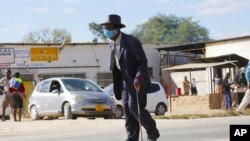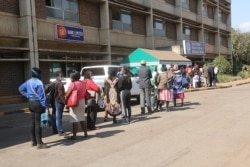Zimbabwe's new COVID-19 lockdown includes a curfew, a ban on intercity travel, and a vaccination blitz aimed at border towns and vendors. But vendors and rights activists say the government should make more vaccine available instead of tightening regulations.
President Emmerson Mnangagwa announced the new measures, including a 6:30 p.m.-to-6 a.m. curfew, on national television Tuesday. He said the restrictions were the result of a recent spike in COVID-19 cases.
“Commerce and industry are to open from 0800 hours to 1530 hours. Travelers from countries with alpha and delta COVID-19 variants will be quarantined and tested on the 1st, 3rd, 5th and 10th day, at their own expense. Those deported back to Zimbabwe will be subject to self-quarantine or will be quarantined in identified places. Travelers with fake COVID-19 documents will attract custodial sentences,” said the president.
The new measures to contain COVID-19 include what the government is calling a “vaccination blitz” targeting borders and vendors.
The head of the Zimbabwe Vendors Initiative for Social and Economic Transformation, Samuel Wadzai, has welcomed the new regulations allowing vendors to operate for limited hours.
But Wadzai said the vaccination program should be voluntary, not compulsory.
“What we can urge the government is for the vaccine to be accessed without queueing for long hours. Let’s decentralize. This is the only way we can do away with these lockdowns. In their nature lockdowns are restrictive and they don’t give us space to operate as informal traders. So, we urge the government to quickly ensure that the vaccines are available,” he said.
About 771,000 Zimbabweans out of a population of 14 million have received their first shots, and 545,000 have received their second inoculations since the program started in February. The country had a monthlong shortage of vaccine until it received 500,000 Sinopharm doses from China on Saturday.
Zimbabwe has about 48,533 confirmed coronavirus infections and 1,761 deaths, according to Johns Hopkins University in the United States, which tracks the global outbreak.
Dewa Mavhinga, head of Human Rights Watch in southern Africa, told VOA the infection figures do not justify a dusk-to-dawn curfew.
“It seems excessive. The government is focusing more on restrictions than on other efforts that are needed to contain the coronavirus — efforts such as ramping up vaccinations, ensuring that all essential workers are vaccinated and ensuring that the adult population in Zimbabwe is vaccinated. There is no movement in that regard,” said Mavhinga.
Zimbabwe’s seven-day average infection rate has increased five times in the last two weeks, according to official figures released this week.
The government says it is importing more vaccine in July and in August to achieve herd immunity for about 10 million people by the end of the year.






